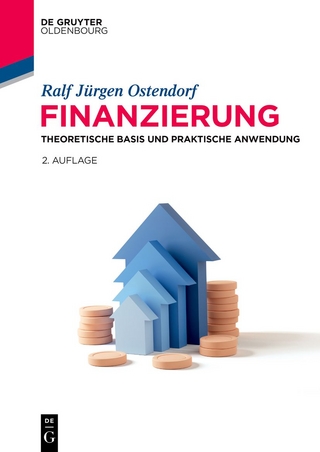
Running the World's Markets
Princeton University Press (Verlag)
978-0-691-13353-9 (ISBN)
The efficiency, safety, and soundness of financial markets depend on the operation of core infrastructure--exchanges, central counter-parties, and central securities depositories. How these institutions are governed critically affects their performance. Yet, despite their importance, there is little certainty, still less a global consensus, about their governance. Running the World's Markets examines how markets are, and should be, run. Utilizing a wide variety of arguments and examples from throughout the world, Ruben Lee identifies and evaluates the similarities and differences between exchanges, central counter-parties, and central securities depositories. Drawing on knowledge and experience from various disciplines, including business, economics, finance, law, politics, and regulation, Lee employs a range of methodologies to tackle different goals. Conceptual analysis is used to examine theoretical issues, survey evidence to describe key aspects of how market infrastructure institutions are governed and regulated globally, and case studies to detail the particular situations and decisions at specific institutions.
The combination of these approaches provides a unique and rich foundation for evaluating the complex issues raised. Lee analyzes efficient forms of governance, how regulatory powers should be allocated, and whether regulatory intervention in governance is desirable. He presents guidelines for identifying the optimal governance model for any market infrastructure institution within the context of its specific environment. Running the World's Markets provides a definitive and peerless reference for how to govern and regulate financial markets
Ruben Lee is CEO of Oxford Finance Group. He was a fellow of Nuffield College, University of Oxford, and worked for Salomon Brothers International. He is the author of "What is an Exchange?"
Foreword and Acknowledgments xi List of Acronyms xiii Introduction 1 Nature of Governance 1 Concerns 2 Issues 3 Approach 3 Structure 4 Part One: Background Information and Analysis 7 Chapter One: Definitions 9 Infrastructure 9 Exchanges, Central Counterparties, and Central Securities Depositories 21 Conclusions 36 Chapter Two: Market Power 40 Preliminary Comments 40 Exchanges 45 CCPs 61 CSDs 71 Conclusions 81 Part Two: Survey Evidence 83 Chapter Three: The Allocation of Regulatory Powers over Securities Markets 85 World Federation of Exchanges 85 International Council of Securities Associations 88 Infrastructure Institutions in Major Markets 90 Conclusions 114 Chapter Four: Regulation and Governance of MarketInfrastructure Institutions: Global Perspective 117 The Financial Sector Assessment Program and Securities Markets Assessments 117 Observations 125 Conclusions 141 Chapter Five: Governance of Market Infrastructure Institutions: A Snapshot 145 Data 146 Analysis 151 Conclusions 164 Part Three: Case Studies 167 Chapter Six: Exchanges 169 Deutsche Borse / London Stock Exchange: Proposed iX Merger 2000 170 Euronext: Purchase of LIFFE 2001 177 Hong Kong Exchanges and Clearing: The Penny Stocks Incident 2002 180 NASDAQ: Attempted Takeover of London Stock Exchange 2006-8 189 New York Stock Exchange: Resignation of Chairman-CEO 2003 194 Osaka Securities Exchange: "Murakami Fund" Purchase of Shares 2005 198 Chapter Seven: CCPs and CSDs 201 Canadian Depository for Securities: Ownership, Usage, and Board Representation to 2008 201 Depository Trust & Clearing Corporation: EuroCCP 2000-2002 207 Deutsche Borse: Creation of Clearstream International 1999-2002 213 Euroclear: Creation, Ownership, and Board Structure up to 2006 217 LCH.Clearnet: Creation and Difficulties 2003-6 231 Part Four: Policy Analysis and Recommendations 245 Chapter Eight: What Is the Most Efficient Governance Structure? 247 Ownership and Mandate: Archetypal Models and Primary Goals 248 Ownership Model and Mandate: Critical Factors Affecting Efficiency 253 The Board: Role and Composition 276 Concluding Discussion and General Propositions 293 Chapter Nine: Who Should Regulate What? 301 Complexity 301 Factors and Constraints Affecting Relative Merits of Different Allocation Structures 307 Concluding Discussion and General Propositions 334 Chapter Ten: How Should Market Infrastructure Institution Governance Be Regulated? 339 Preliminary Comments 339 Investor Protection 342 Efficiency, Fairness, and Transparency 348 Systemic Risk Reduction 353 Concluding Discussion and General Propositions 357 Authorities 363 Cases and Decisions 365 Notes 367 References 395 List of Contributors 433 Index 437
| Erscheint lt. Verlag | 17.1.2011 |
|---|---|
| Zusatzinfo | 25 halftones. 21 tables. |
| Verlagsort | New Jersey |
| Sprache | englisch |
| Maße | 152 x 235 mm |
| Gewicht | 907 g |
| Themenwelt | Wirtschaft ► Betriebswirtschaft / Management ► Finanzierung |
| Wirtschaft ► Volkswirtschaftslehre ► Wirtschaftspolitik | |
| ISBN-10 | 0-691-13353-0 / 0691133530 |
| ISBN-13 | 978-0-691-13353-9 / 9780691133539 |
| Zustand | Neuware |
| Haben Sie eine Frage zum Produkt? |
aus dem Bereich


